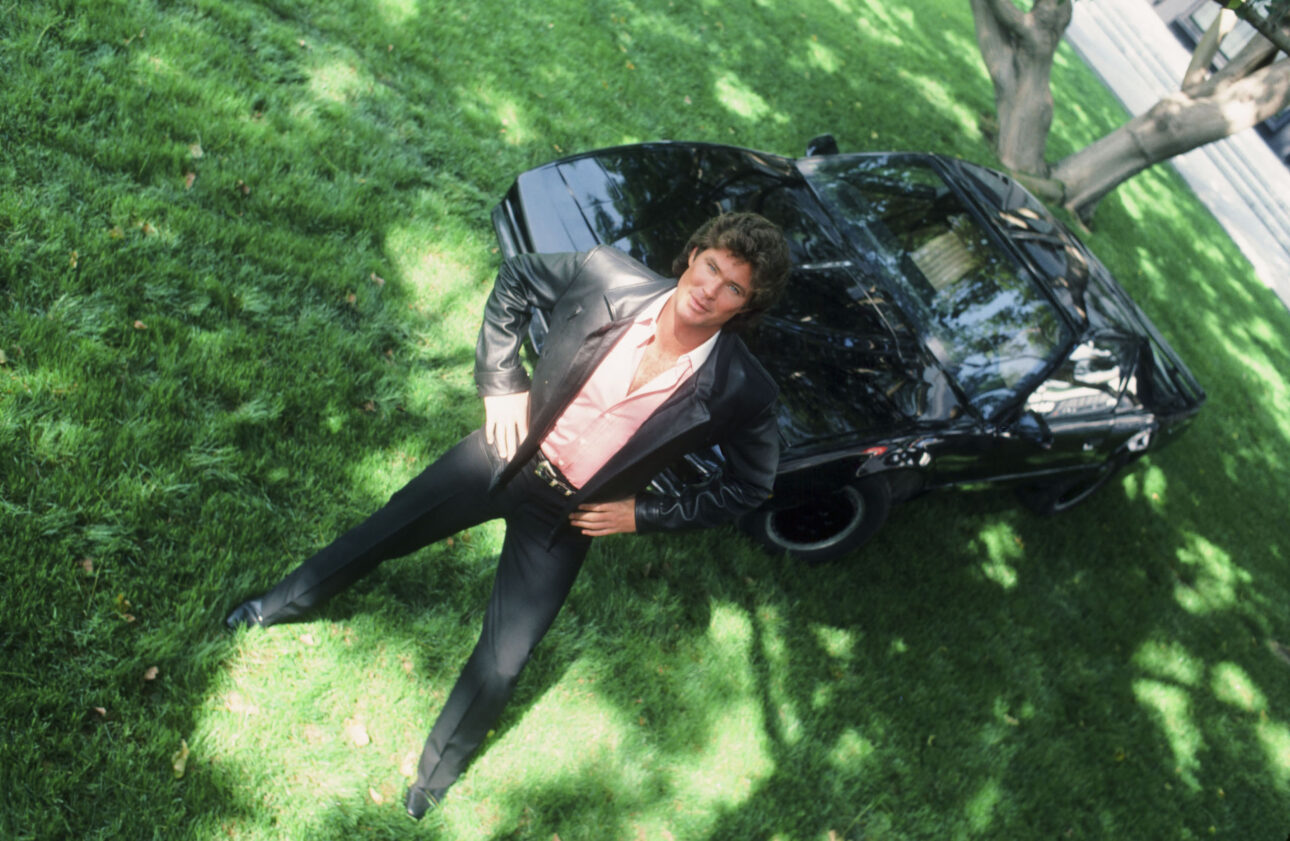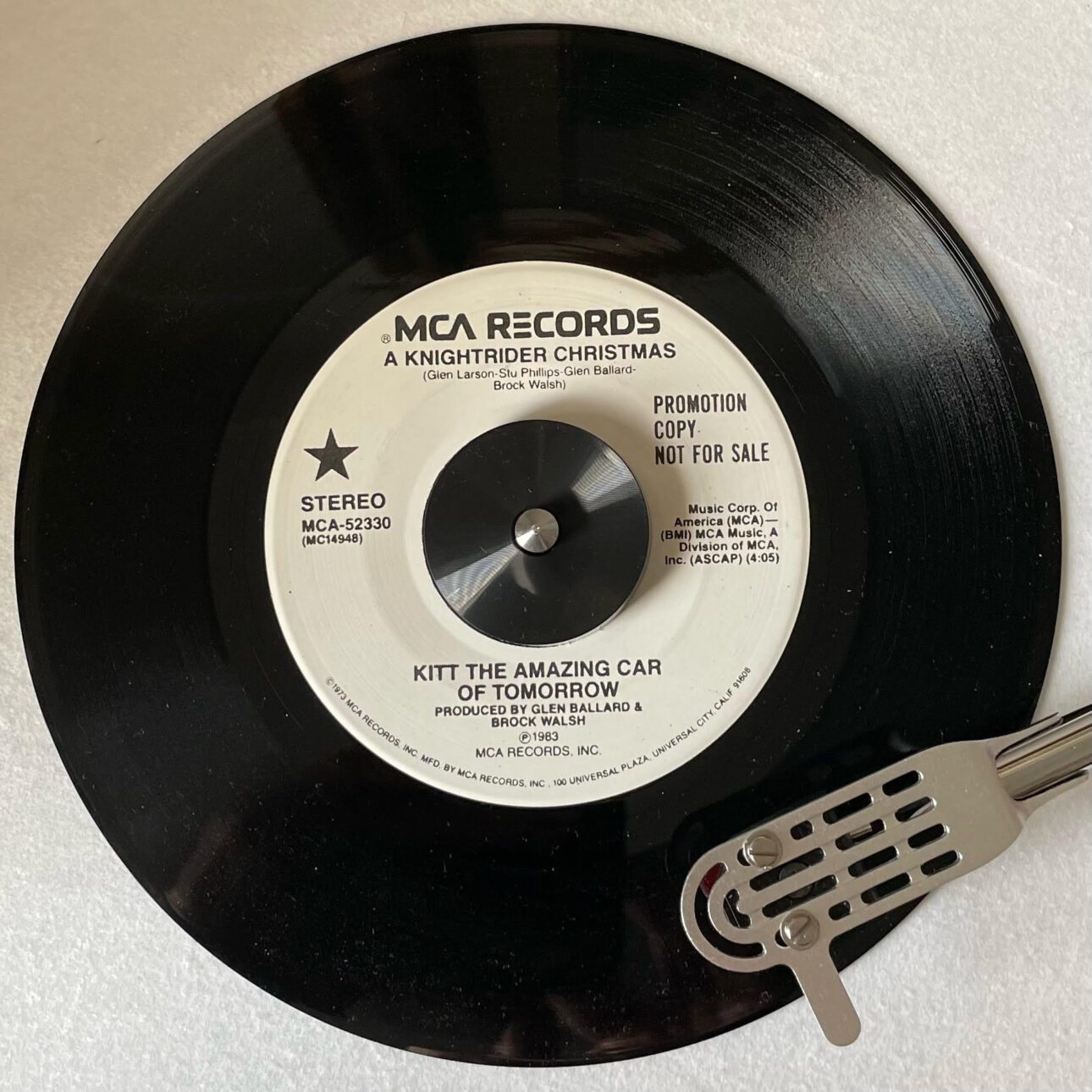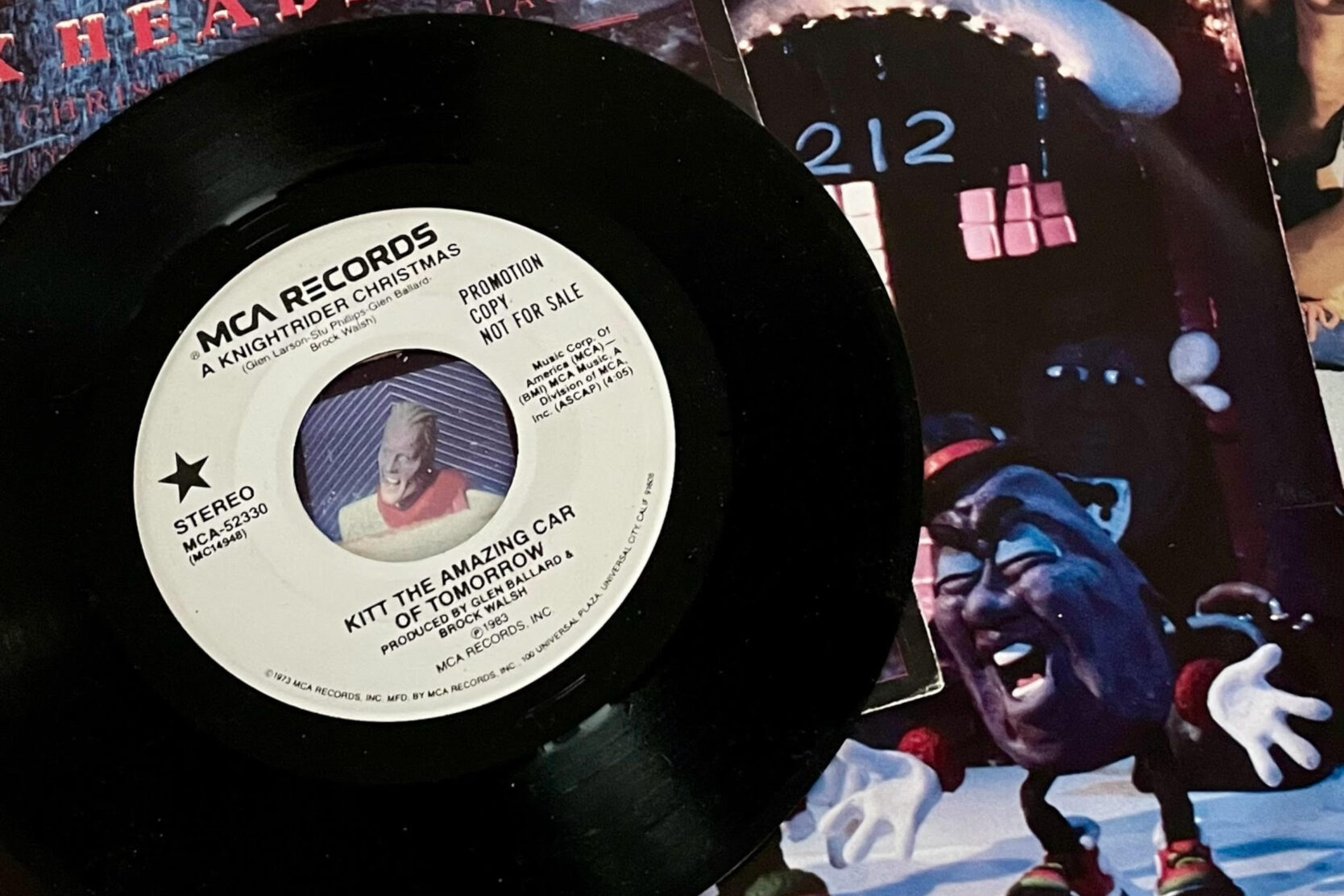The 1980s were possibly the most fertile decade for the consumerist cash-grab intersection between notable pop culture IPs and novelty Christmas music.
A plethora of beloved toy-and-TV franchise characters, including Pac-Man, Barbie, the Smurfs, Care Bears, and Strawberry Shortcake, among countless others, all got their own full-length holiday albums at some point during the “greed, for lack of a better word, is good” era. Even some of the most recognizable advertising icons of the decade—including New Coke spokesman Max Headroom and the majestically claymationed California Raisins—got in on the action by releasing their own seasonal vinyl seven-inches.
Not even a blockbuster property as huge as Star Wars was immune to the temptation of a holiday album—though it should be noted that Meco’s 1980 LP, Christmas in the Stars, is only worth seeking out for one non-Yuletide reason: It features the first professional recording of one of the decade’s biggest stars, as a young Jon Bon Jovi sings lead on that old holiday chestnut “R2-D2 We Wish You a Merry Christmas.”
One classic example of this ephemeral culture-meets-commerce phenomenon is the 1983 Knight Rider-themed holiday single “A Knight Rider Christmas” (though it’s often referred to as “The Night KITT Saved Christmas”), charmingly credited to “KITT the Amazing Car of Tomorrow.” Embodying the very definition of a time capsule in its musical, lyrical, and physical presentations, the song features an instrumental bed anchored by the Knight Rider synth theme, a vocal track sung-spoken in that time-stamped early-‘80s faux-rap cadence, and a narrative featuring the show’s tag-team duo (Michael Knight and his sentient talking car, KITT) rushing in to save Christmas after Santa crashes his sleigh—all pressed onto a 45 RPM vinyl single. (So far it’s the only authorized release, as the track has never been reissued or digitized for streaming platforms).
While this seasonal slice of pure ‘80s pop culture has been mostly relegated to the dusty “lost media” corners of the Internet (the seven-inch single rarely even pops up on secondary vinyl reseller sites), this year’s holiday season marks the 40th anniversary of its original release—an apropos milestone to uncover its story from beneath the sands of time.
While it would be a fun enough endeavor filling in the gaps of how a thing like “A Knight Rider Christmas”—or, more accurately, “A Knightrider Christmas,” as it’s surprisingly misspelled on both the commercial and promo versions of the vinyl single—came to exist, it’s also worth examining for another reason: The song embodies an impressively expansive pop culture Venn diagram when you look at the list of songwriters who created it. The first two names in the credits (Glen Larson and Stu Phillips) are there simply because they are, respectively, the creator of Knight Rider and the composer of the show’s infectious theme song.
However, the other two songwriters in the list—Glen Ballard and Brock Walsh—may surprise eagle-eyed music fans who have perused the liner notes of some of their favorite albums from the last six decades or so.
While both industry vets have sprawling, awe-inspiring résumés that run well into the present day, Ballard is perhaps best-known for producing and co-writing one of the Top 20 best-selling albums of all time (Alanis Morissette’s Jagged Little Pill), and Walsh has built a prolific career singing with artists like Linda Ronstadt and the Eagles; writing songs for such chart-topping acts as the Pointer Sisters, Christina Aguilera, and Celine Dion; and co-producing the original Andrew Gold version of “Thank You for Being a Friend” (whose Cynthia Fee-led cover went on to become the immediately recognizable theme song of The Golden Girls). Both have written for a variety of beloved films as well, with Walsh having worked with renowned composer James Horner on both Hocus Pocus and Legends of the Fall and Ballard winning a Grammy for his work with Alan Silvestri on The Polar Express.
To solve the mystery of how they both wound up writing a Knight Rider-themed Christmas song somewhere along the way, SPIN reached out to both Ballard and Walsh to try and summon their recollections—as understandably fuzzy as 40-year-old memories of your 9-to-5 day job tend to be. At that point in their careers, both were working as staff songwriters for MCA/Universal—a position that afforded them the opportunity to simultaneously write hit songs for some of the era’s top acts, along with TV shows like Knight Rider that were being produced and filmed on the same Universal lot as their recording studio.
“My first job when I got to Hollywood was answering the phones for Elton John’s Rocket label,” recalls Ballard. “I wrote my first published song—‘One Step,’ which was recorded by Kiki Dee, a protégé of Elton John who had a big hit duet with him called ‘Don’t Go Breaking My Heart’—while I was still answering the phones there. After that, the people at MCA offered me a staff writing position for $100 a week—not as a salary but as an advance against my royalties. That’s what got me out of answering the phones and into professional songwriting and publishing.”
For his part, Walsh landing full-time employment as a songsmith was simply the next step in his already-in-motion career. “My signing with MCA was a reaction to having spent four to five years on the road as a touring musician with artists like Linda Ronstadt, Andrew Gold, Karla Barnoff, and Jennifer Warnes,” he says. “But that life takes a toll. A couple of my friends had gotten jobs as staff songwriters, and I heard that MCA was a good place to land. Part of the appeal of that specific job was the opportunities that came through the door of being on the lot at Universal.”
During those first few years of the 1980s, many of those opportunities included penning songs for a variety of successful artists. For example, Walsh co-wrote the Pointer Sisters’ Grammy-winning single “Automatic” from their triple-platinum Break Out LP, and Ballard landed an early No. 1 hit with his co-write of George Strait’s Country-chart-topping single “You Look So Good in Love.”
This period was also important for the professional relationships they were built and fostered, including both working closely with legendary producer Quincy Jones across multiple projects.
“For whatever reason, Rod Temperton kind of became my sponsor early in my career, and he was responsible for taking one of my early hits to Quincy, a song called ‘What’s on Your Mind’ that George Benson recorded,” says Ballard. “Quincy took me under his wing, and I ended up writing a song called ‘Nite Line’ that almost made it onto Michael Jackson’s Thriller. I recorded a demo with Michael and was around for the whole recording of that album. My song didn’t make the final cut, but I was able to stick around with that crew.” (Ballard would go on to co-wrote Bad’s triple-platinum No. 1 hit “Man in the Mirror” and the album track “Keep the Faith” from Jackson’s culture-dominating 1991 LP, Dangerous).
Back in 1983, Ballard and Walsh were also essentially colleagues with one of the most popular TV shows of the time—the David Hasselhoff-led Knight Rider—which led them to another unique opportunity: writing a Christmas song to coincide with the airing of the holiday episode “Silent Knight,” set to air on December 18, 1983. Knight Rider ran for four seasons (1982-1986) and its second season—during which the Christmas episode and holiday single were released— proved to be its most popular, at least as far as Nielsen viewer ratings and multi-market pop cultural imprint is concerned.
“All I really remember about getting the assignment was that they were thinking of doing a Knight Rider Christmas episode and wanted a song to somehow go along with it,” recalls Walsh. “I think the hypothetical was posed, ‘What if something happens to Santa’s sleigh and Michael and KITT have to save Christmas in some way?’ So we had to come up with some scenario by which a talking car saves the day. As we had for other projects, I probably wrote most of the lyrics, and Glen wrote most of the music and recorded the track. We quickly did the demo in our studio we called ‘the dungeon,’ and that probably ended up being the final master for this one.”
The duo emphasize that, with projects like this, an efficient yet speedy turnaround was crucial. They essentially received a list of potential projects every Monday morning, wrote and recorded as many songs as they could throughout the week, and delivered finished demos on or before the Friday of that same week.
“When you’re a professional songwriter, you are thrilled to get any gig, especially for a huge TV show. It was like ‘Yeah, we’ll absolutely write a Christmas song for Knight Rider—come on, let’s go!’” chuckles Ballard. While they had to write the song around the show’s familiar theme song, they still managed to embellish the track with the instrumental flavors of the time. “We just tried to make it sound contemporary for 1983—wiggly synths and Moog bass, those kinds of sounds. Plus, we were writing a song for a talking car,” he laughs, “There’s not that many of those out there—talking cars or songs about them.”
With the lyrics and music locked down, Walsh and Ballard just had to figure out the track’s vocal components—not only the smoothly flowing, quasi-rapped narrative verses but also the scripted conversational dialogue between Michael and KITT. While there are no vocal credits listed on the limited-run vinyl single, both songwriters believe it may have been Walsh who provided the song’s distinctly early-‘80s rap-style verses.
“I’m not the world’s greatest lead singer, but I’m a really good chameleon,” says Walsh. “I can sound a lot of different ways, which also served me well in a brief career as a jingle singer.” (For another pop culture-related tangent, it should be noted that Walsh portrayed the original singing voice for the late ‘80s, moon-faced McDonald’s spokesman, Mac Tonight).
As for the track’s dialogue parts, it’s very clear that Hasselhoff did not provide any speaking lines for his Michael Knight character. While Walsh and Ballard would eventually work with Hasselhoff on his own debut album (1985’s Night Rocker), both believe it was once again Walsh who voiced Michael on the track.
What’s less clear is whether renowned actor William Daniels, the original voice of KITT, reprised his role. While spot-on, sassy lines like “You call towing a herd of a reindeer and a fat man in a red suit a great time? Really, Michael?” do sound in both tone and delivery like they could be Daniels, there’s an air of mystery surrounding the specifics.
“It probably is William Daniels,” says Ballard, “because they shot a lot of that show right there on the same lot, so if it’s him we would’ve recorded him right there.” Brock cautiously co-signs the sentiment: “I can easily imagine William Daniels taking the elevator down to the basement of the 402 building to record a couple quick lines of dialog and then leaving 15 minutes later. I think I have a vague memory of him being in the studio with us, but am I right? I’m not completely sure.”
(SPIN reached out to William Daniels to verify if he participated in the recording of the “A Knight Rider Christmas” single. After listening to the track, Daniels did say it was his voice, but he politely declined to be interviewed because he had no specific recollection of the recording session or the song.)

Upon the song’s completion, it was pressed to vinyl and released to radio and retail in time for the 1983 holiday season. Archives of secondary market online sales show at least two versions of the vinyl single—a commercial version with the standard rainbow-emblazoned MCA Records label sticker and a white-label promo version sent to radio—and both seem to have been shipped in a generic white paper sleeve instead of a glossy picture sleeve with accompanying artwork. On the commercial version, the B-side is simply an instrumental version of the track (as was typical during this period).
Though it’s hard to find any record of how much radio play it received or how exactly it was marketed to consumers at the time, SPIN was able to find archival records that it was at least played a handful of times on The Dr. Demento Show radio program throughout the 1980s.
These days, Walsh and Ballard are both building the musical stagecraft portion of their ever-expanding skill sets. Walsh helped pen the 90-minute symphonic oratorio Émigré and recently returned from Shanghai, China, where he debuted the show with the Shanghai Symphony Orchestra, ahead of additional performances with the New York Philharmonic scheduled for early 2024. Ballard co-wrote the music and lyrics to Back to the Future: The Musical, which has been widely popular in the U.K. and just recently launched on Broadway, where it’s currently set to run through at least next summer.
Even for all of their chart-topping, award-winning past and present successes, the duo still seem to hold a soft spot for some of their lesser-known, more under-the-radar releases like “A Knight Rider Christmas.” Asked whether the ’80s-nostalgic holiday single warrants a potential vinyl repress for something like Record Store Day, they both laugh and seem warm to the thought.
“Oh, yes, I’m sure the world is just panting in anticipation for that,” Walsh notes with warm self-deprecation. Ballard seemed totally on board as well: “There’s never enough Christmas music because every year they just recycle the same stuff. I mean, this is a Christmas song about Knight Rider—they should absolutely re-release it. Let’s make it happen!”
As “A Knight Rider Christmas” celebrates its 40th holiday season, it remains both a quintessential ‘80s holiday totem and a surprisingly impressive hub connecting pop culture threads from the last half-century. Consider this retrospective remembrance a “reverse Caesar”—we come to praise “A Knight Rider Christmas,” not to bury it.






